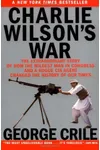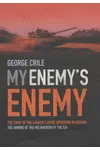Picture a fearless journalist who peeled back the curtain on covert CIA operations, weaving tales that thrilled and provoked—meet George Crile! Born in 1945, this American storyteller made waves at CBS News and penned the bestselling Charlie Wilson's War, a gripping account of Cold War intrigue that reshaped how we view global conflicts.
With a knack for diving into dangerous topics, Crile’s work blended investigative grit with cinematic flair, earning him both acclaim and controversy. From Vietnam to Afghanistan, his stories didn’t just report history—they unpacked its messy consequences with a bold, engaging voice.
The Making of George Crile
George Crile III was born on March 5, 1945, in San Diego, California, into a family of distinguished surgeons. But instead of scalpels, he wielded a pen, drawn to journalism’s power to expose hidden truths. After studying at Georgetown University, Crile cut his teeth in print journalism before joining CBS News in 1976. His early work, including producing documentaries, showcased his fearless approach to tackling complex, often controversial subjects like the CIA’s secretive operations.
As a former Marine reservist, Crile brought a disciplined yet audacious perspective to his reporting. His ability to befriend sources, from congressmen to operatives, gave him unparalleled access to the inner workings of power, setting the stage for his most iconic work.
George Crile’s Unforgettable Stories
Crile’s career was defined by his ability to turn dense, shadowy histories into compelling narratives. His 2003 book, Charlie Wilson’s War: The Extraordinary Story of the Largest Covert Operation in History, is his magnum opus. This meticulously researched account chronicles how Texas Congressman Charlie Wilson orchestrated the CIA’s massive funding of Afghan mujahideen against Soviet forces in the 1980s. The book’s vivid storytelling and shocking revelations about unintended consequences—like the rise of radical extremism—made it a bestseller and inspired a 2007 film starring Tom Hanks.
At CBS, Crile produced groundbreaking documentaries that stirred debate. His 1976 piece, The CIA’s Secret Army, exposed the agency’s role in the Bay of Pigs invasion, while The Uncounted Enemy: A Vietnam Deception (1982) alleged that U.S. military leaders underreported enemy strength during the Vietnam War, sparking a $120 million lawsuit from General William Westmoreland. Crile’s 1978 documentary, The Battle for South Africa, earned him a Peabody Award and an Emmy for its incisive look at apartheid’s complexities.
His style was fearless yet accessible, blending rigorous research with a knack for humanizing larger-than-life figures. Whether profiling rogue operatives or unmasking geopolitical blunders, Crile’s work challenged readers to grapple with the moral ambiguities of power.
Why George Crile Matters
George Crile’s legacy lies in his courage to confront uncomfortable truths. His reporting on CIA operations and Cold War policies didn’t just inform—it reshaped public understanding of America’s role in global conflicts. Charlie Wilson’s War remains a touchstone for studying covert operations and their ripple effects, from the Soviet Union’s collapse to the unintended empowerment of extremist groups. His work at CBS set a high bar for investigative journalism, proving that dogged reporting could hold power to account.
Though Crile passed away in 2006, his stories continue to resonate, urging readers to question the hidden costs of political decisions. His blend of thrilling narrative and unflinching critique makes him a pivotal figure in modern journalism and nonfiction storytelling.
- Born: March 5, 1945, San Diego, California
- Key Work: Charlie Wilson’s War (2003)
- Awards: Peabody Award, Emmy Award (1978)
- Died: May 15, 2006
Snag Charlie Wilson’s War and dive into George Crile’s thrilling world of spies, rebels, and untold history!

